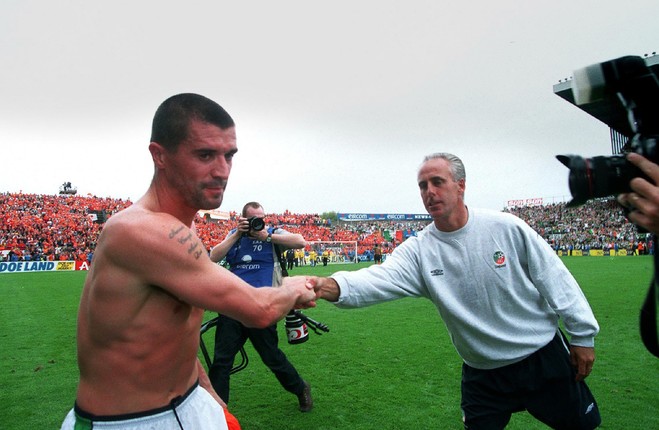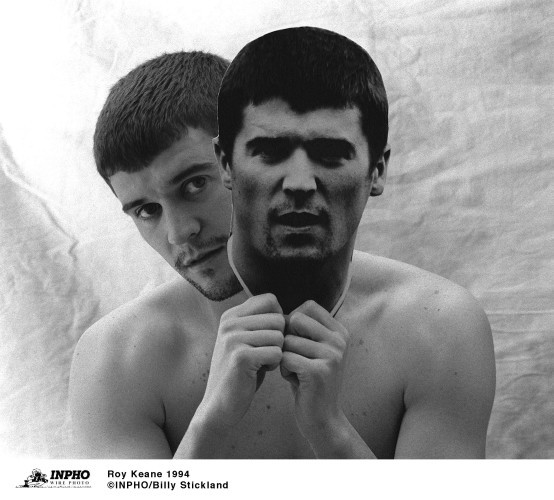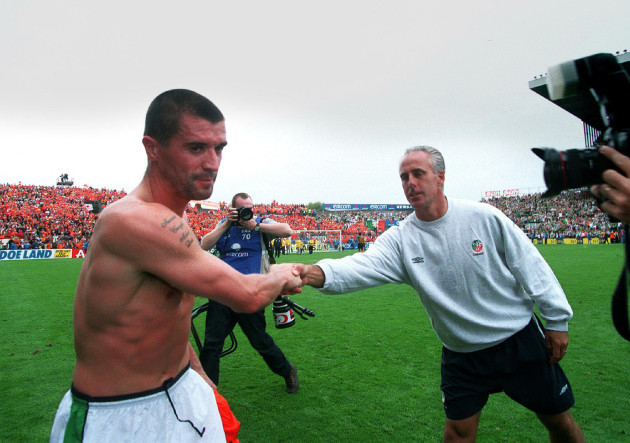ROY KEANE IS the tenth subject in our series of articles focusing on the most important Irish sportspeople of the last 100 years. The list will include GAA players, Olympians, boxers, golfers and more who dared to dream.
“You can laugh all you want, but that was the World Cup.”
Roy Maurice Keane was born on 10 August 1971 — the fourth of five children to Mossie and Marie — at 88 Ballinderry Park in Mayfield, a suburb of Cork city.
Keane has said a number of times that he hates his life story being painted as a rags to riches tale, and it’s true that his childhood was no different than most Irish kids growing up in the 70s.
With an interest in a number of sports from an early age, Keane showed a significant talent for boxing but the draw of football was too much for the young Spurs and Celtic fan whose favourite player was Glenn Hoddle.
Indeed, as Keane says in his first autobiography, one of his happiest childhood memories was watching Tottenham beat Manchester City in the replayed 1981 FA Cup final.
However, even at a young age, the midfielder knew he was different from the Hoddles and Ricky Villas of this world and tailored his game as such.
He was, therefore, delighted to get the option of a trial with the Ireland U15s despite having a “lingering doubt” that there was a pro-Dublin bias involved in the selection of these teams.
Keane was substituted with 15 minutes to go in his match and was not selected for the final trial, a moment he calls the “worst disappointment” of his life.
The fact that four of his Rockmount team-mates were awarded places in the squad did little to convince Keane that there was an anti-Cork bias at play.
His hopes of playing in England dashed, after all that’s what international schoolboy football was really about, in 1989 Keane signed for semi-professional outfit Cobh Ramblers and proved so good that he’d often line out for the youths and first team in the same week.
One particular game, against Belvedere Boys in Fairview Park in February 1990, would prove career defining.
Cobh were losing the match but Keane was still determined to, as he said himself, “show those Dublin bastards” what he was made of. He put in a virtuoso performance, one that prompted Nottingham Forest scout Noel McCabe to ask him to travel to England for a trial with the two-time champions of Europe.
Like many Irish players who made the trip across to England, Keane initially found life at Forest tough but had a good enough relationship with Brian Clough that the club allowed him regular trips back to Cork to help him settle.
After working his way through the U21s and reserve team, by 1991 Keane was a regular in the Forest starting XI and it became clear that the club would struggle to hold on to their young Irish midfielder.
The Corkman knew he held all the aces too and though he signed a new contract, crucially it contained a relegation release clause.
Sure enough, that season — and despite Keane’s best efforts that saw him voted Club Player of the Year — Forest were relegated and the then 21-year-old was one of the hottest properties in English football.
It looked for all the world like he was about to sign for Blackburn Rovers before an administrative error blocked the move from going ahead on a Friday. Manager Kenny Daglish was confident, however, that they had a gentleman’s agreement in place that would allow the transfer be completed the following Monday.
Sensing an opportunity to swoop in, Alex Ferguson called Keane and asked if he’d like to play for Manchester United instead. Keane agreed and moved to Old Trafford for a then British record £3.75 million.
During his 12 years at Old Trafford, Keane established himself as the finest box-to-box midfielder of his generation, making over 450 appearances and scoring more than 50 goals.
Undoubtedly his greatest performance in a red shirt came away to Juventus in their 1999 Champions League semi-final second leg.
2-0 down, Keane scored United’s first goal as he drove their comeback despite picking up a needless booking that ruled him out of the final. It was a display almost perfect in its execution and set United on the way to a second European Cup.
In addition to the Champions League, Keane would win four FA Cups and seven league titles with United, before a falling out with Ferguson saw him leave Old Trafford.
A brief stay with Celtic in 2005/06 saw them win the league and cup double before calling time on his playing career.
The story of Keane’s time in an Ireland shirt is, of course, dominated by the events on a small Pacific island in the lead up to the 2002 World Cup but, often forgotten in the conversation, is the fact that the Corkman almost single-handedly dragged his country to that competition by sheer force of will.
Keane scored three of his seven international goals in that qualification campaign, including a crucial effort in the 1-1 draw with Portugal at Lansdowne Road.
However, his standout performance in an Ireland shirt will always be against the Dutch in September 2001 when his early ‘reducer’ on Marc Overmars set the tone for an historic Ireland win.
From a youngster in Cork who was once told he was too small to make it as a footballer to one of the greatest Irish players to ever play the game, Keane’s road may at times have been rockier than most, but his determination and will to win has been rarely matched in an Irish sportsperson.
Over the next two months, in association with Allianz Insurance, we’ll be profiling the 16 most important Irish athletes of the last 100 years.
Allianz Insurance — The world belongs to those who dare.



